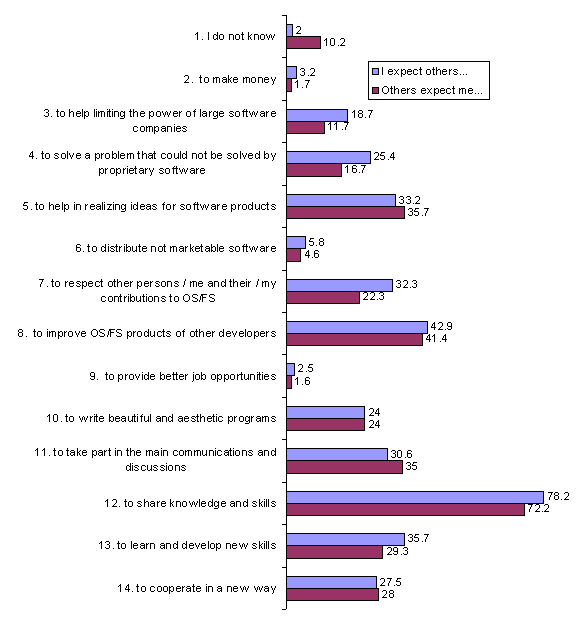Thanks for the response, Clemens. I love a good debate.
After reading the response to my letter, I’ve finally discovered the argument that Clemens Vasters is trying to make. It’s not that sharing is the problem - it’s that people are making money off the work of these duped open-source kids that get nothing in return.
He’s hidden his point underneath a cloak of hatred for open-source evangelists and companies, calling the companies that profit off open-source the selfish ones. Unfortunately, this is the result of not understanding the open-source ecology I mentioned before works whatsoever, despite his claims.
I enjoyed how he called RedHat, in particular, a “deeply unethical entity”. As an open-source contributor, I find their actions to be highly beneficial to the community at large. RedHat has provided an aggregation and polishing service on top of all the relevant open- and free-software available. This is one of many ways of making money off open source, described in Eric S. Raymond’s Magic Cauldron essay. As an aside, I suggest anyone considering attacking open-source read this first.
What distribution of Linux do I run at home? RedHat. They’ve given me the ability to toss a high-quality OS on my computer at home for zero cost. Not only is it “free” as in gratis, but I have the ability to fix bugs I find and submit them back. This is the “free” as in libre part of open-source that Clemens clearly does not understand. This is the part of the ecology Clemens has missed. This is how myself, as an individual, can hold the hand of a giant such as RedHat while both of us gain in return. At no time do I feel ripped of by RedHat. In fact, I get a personal sense of pride whenever I know that something I contributed, no matter how small, has made it into all of the copies of RedHat out there.
I’m pretty sure Clemens still don’t understand this distinction I’ve described above. Sure I don’t see any money from RedHat, but that’s not the point of my life. I have a job that pays the bills. I contribute to open-source to reap the rewards of helping polish a solid OS at home that I like. If you want to make money on the side, go ahead - but don’t call me an idiot because I choose altruistic rather than monetary reasons for my hobby.
Also, if you say that I am confusing “free software” and “open source”. I am not. “Open” is the political argumentation line, “free” is the economic argumentation line of the same thing. If this sort of confusion exists for mostly everyone and one of the most often repeated line in OSS arguments is “you don’t understand the difference”, then that’s caused by the simple fact that these terms are simply two angles of looking at the same story. The OSS “eco-system” only functions because both is true.
Here’s where his argument breaks down. Freedom (free as in libre) is the most important part of open-source. It’s a shame that english has lumped together libre and gratis- two related, but fundamentally different principals- under the same word. This is where most people are often tripped up. However, the mandate of the Free Software Foundation is pretty clear. In fact, the first words on their homepage are:
Free as in Freedom
I don’t have the freedom to modify my Windows installation or the copy of the .NET framework installed on my system. In fact, if there’s a bug, I’m at Microsoft’s mercy to fix and distribute the patch. With the .NET framework itself, I’ve personally used reflector to track down and diagnose a number of bugs, but I haven’t been able fix them. Our company ends up waiting a year for the next framework release while we try to create a band-aid around the problem in the meantime.
Now, fast-forward to the Mono project. I find a bug in their framework. Not only do I have the source available, but I can fix it and submit it back to the project for inclusion in the next release. I don’t have to work around it in my own product. Oh yeah - the other users of Mono also benefit from this. This is just part of the freedom of open-source.
In his reponse, I found his statement of a “no-GPL” policy at his company to be counter to his original argument. If he finds companies that distribute the end result of an open-source project without rewarding the original programmers to be selfish, this the BSD license is absolute worst one could choose. There’s nothing stopping me from taking dasBlog, polishing it up and turning it into a boxed product of my own and paying Clemens nothing. Not only that, but I benefit from your improvements while you see none of mine. Isn’t this what you describe as selfishness?
Matthew, selfish is not the one who wants to get a tangible reward for his work. Selfish is the one who denies that reward.
Commercial software developers are not selfish. Expecting money for hard work is not selfish. When one insults others that give with no expectation of a reward, they are living in selfish world of their own. I’m puzzled by Clemens’ personal contraditions with regards to giving. He donates his own time to maintaining an open-source blog product, but then turns around and calls others doing the same thing clueless. Strange. I’m pretty sure he believes that all open-source developers are poor, parent-mooching cheapskates. This is a sad way to view the world.
I leave you now with the results of the FLOSS (free/libre open-source survey) results describing the reasons that open-source developers contribute. Perhaps with a little understanding, you might learn to hate less:

Read full post